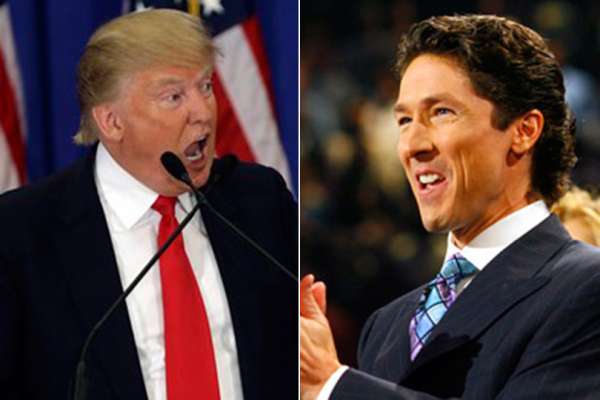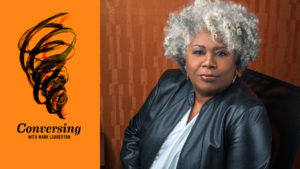Before it began to rain in Houston last week, the spectacularly wealthy pastor Joel Osteen could have opened up his megachurch to serve as a logistics center. He could have announced that evacuees were welcome to take shelter there when Hurricane Harvey landed. Instead he wrote tweets like “God’s got this” and “don’t drift into doubt and fear … stay anchored to hope.” Only a couple of his posts on Twitter offered “prayers.”
On Sunday, Mr. Osteen’s church announced that it was inaccessible because of “flooding.” But intrepid journalists proved otherwise. After Mr. Osteen was humiliated on social media, he finally opened the 16,800-seat church to the public on Tuesday. When asked about the delay, Mr. Osteen said that “the city didn’t ask us to become a shelter.”
President Trump, too, revealed his morally bankrupt soul during the storm when he said that he timed his pardon of the racist former sheriff Joe Arpaio to coincide with the hurricane’s landfall because he assumed that it would garner “far higher” TV ratings than usual. Mr. Trump did visit Texas, but there was apparently no mention of dead or displaced Texans, and no expressions of sympathy.

Mr. Trump and Mr. Osteen are mirrors of one another. Both inherited their father’s businesses. Both enjoy massive support among evangelicals, yet they lack a command of biblical scripture. Both are among the 1 percent. Most important, both are salesman who need winners in order to keep their egos big and the cash flowing. While he answered calls about the storm, Mr. Trump modeled several different hats that are for sale on his website, and Mr. Osteen initially sought contributions on his church’s webpage even as it was closed to the community. (The contributions request has since been removed.)
Natural disasters like Hurricane Harvey are the worst kind of crises for people like Mr. Trump and Mr. Osteen, who purvey their own versions of the prosperity gospel. This is a belief that says if you think positively and make affirmations, God will reward you with financial success and good health. If you don’t, you may face unemployment, poverty or sickness. (Mr. Trump in particular always speaks in laudatory terms about himself and his companies.)
But the problem is that it’s hard to promote “Your Best Life Now” or “The Art of the Deal” to people whose houses have flooded or been blown away, or to evacuees who have only the clothes on their backs.
Mr. Trump’s and Mr. Osteen’s brands are rooted in success, not Scripture. Believers in prosperity like winners. Hurricanes and catastrophic floods do not provide the winning narratives crucial to keep adherents chained to prosperity gospel thinking. That is why it is easy for both men to issue platitudes devoid of empathy during natural disasters. They lack compassion for people who are not prosperous, because those people simply did not follow the rules.
This empathy-less prosperity gospel also permeates attitudes about the role of our government. Consider when Housing and Urban Development Secretary Ben Carson said in March that poverty was a “state of mind.” Representative Mo Brooks of Alabama echoed this in a May interview when he said that “people who lead good lives” don’t have to deal with pre-existing medical conditions. This kind of thinking by the Republicans, that individual effort and religious faith are paramount, has desensitized them to poverty, disaster and the vagaries of disease. They have already cut millions from federal disaster aid, and if an uptick in disasters occurs, many more people will die.
Mr. Trump and Mr. Osteen aren’t the first to display such tone deafness. President George W. Bush, an evangelical known for his “compassionate conservatism,” was crucial in promoting an individual ethic of compassion. “Government cannot solve every problem,” Mr. Bush said in 2002, “but it can encourage people and communities to help themselves and to help one another.” What that really meant was churches, rather than the government, needed to administer social aid programs. The self-reliance of individuals and communities would substitute for federal support.
So while the storm churns through Texas and Louisiana, causing floods, death and misery, it is time to consider the damage the prosperity gospel has done to America. Mr. Trump and Mr. Osteen unwittingly revealed its ugly underbelly: the smugness, the self-aggrandizing posturing. It has co-opted many in the Republican Party, readily visible in their relentless desire to strip Americans of health care, disaster relief and infrastructure funding.
Now Ted Cruz and Texas Republicans seek federal disaster aid, although they voted against the same in the aftermath of Hurricane Sandy. The Republicans in states affected by the disaster will find out soon enough what it feels like to come to Washington and relief organizations with their hat in their hands.
The survivors of Hurricane Harvey do not need empty tweets and platitudes from people like Donald Trump and Joel Osteen. They have shown beyond a shadow of a doubt that, as we say in Texas, they are all hat and no cattle.
originally published in the New York Times



